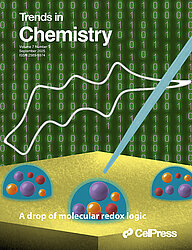In the first article resulted from the research stay of Dr. Kirill Monakhov (Head of IOM's Switchable Molecularly Functionalized Surfaces Group) with Patrick Unwin’s group at the Institute of Advanced Study, University of Warwick, co-authored with Noah Al-Shamery and Pooi See Lee (Nanyang Technological University Singapore), the scientists underpin the importance and far-reaching potential of scanning electrochemical cell microscopy (SECCM) for achieving radically new molecular surface engineering for memory and logic.
In their Forum article, Monakhov and colleagues showcase how this strategy opens new pathways for information storage and redox-based computing, particularly through the use of inorganic oxo clusters such as polyoxometalates. The work reflects a transnational collaboration across Warwick (UK), Leipzig (Germany), and Singapore, combining expertise in electrochemistry, surface engineering, and switching molecules.
Dr. Monakhov considers this concept also a springboard for exploring the transport and control of molecular spins and the generation of spin hyperpolarization both locally and over long ranges through molecular structures in non-equilibrium liquid states on surfaces. Dr. Monakhov: "This technology can be of high fundamental significance for HYP*MOL, a Collaborative Research Center (Transregio) on hyperpolarization in molecular systems between Leipzig and Chemnitz. Looking ahead, I see exciting opportunities to introduce spin-active molecules, single-molecule magnets, inorganic radical pairs ... into such nanoscale liquid domains. This will enable the study of electric/magnetic-field-modulated spin interactions within and between droplets, as well as their readout using magnetic resonance and spintronics techniques."
The article "Redox-programmed surfaces via scanning electrochemical cell microscopy (SECCM)" has been published in Trends in Chemistry (2025), 7, 494–496 and featured prominently on the front cover of the journal. The article is among the most-read articles in the journal over the past 30 days.

